SEPTEMBER 27- TODAY’S READING FROM THE ONE YEAR BIBLE- ISAIAH 51:1-53:12; EPHESIANS 5:1-33; PSALM 69:19-36; PROVERBS 24:7
TODAY’S READING FROM THE OLD TESTAMENT- ISAIAH 51:1-53:12
You will see a pattern in today’s reading from Isaiah.
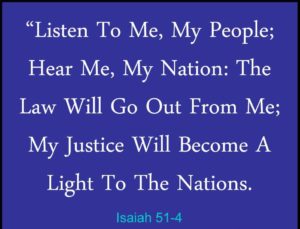 There are three calls to his faithful remnant to ‘listen’ (Isaiah 51:1, 4, 7) and three calls to ‘awaken’ (Isaiah 51:9, 17; 52:1). The Lord calls us to hear His Word, to give our attention to what He has said and is saying. But hearing is not enough. We must ‘awaken’. God’s Word is not meant to ‘comfort’ alone. It is not meant to make us passive. It is meant to make us active with fresh obedience and praise.
There are three calls to his faithful remnant to ‘listen’ (Isaiah 51:1, 4, 7) and three calls to ‘awaken’ (Isaiah 51:9, 17; 52:1). The Lord calls us to hear His Word, to give our attention to what He has said and is saying. But hearing is not enough. We must ‘awaken’. God’s Word is not meant to ‘comfort’ alone. It is not meant to make us passive. It is meant to make us active with fresh obedience and praise.
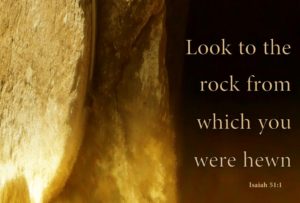 First, there is a call to those who seek the Lord to ‘listen’ and ‘look’ to God, who has called us by His grace (Isaiah 51:1-3). It is the Rock of God’s self-revelation that constituted the nation of Israel as His covenant partner. God initiated this relationship in which He has purposed to make Himself known. We who believe have become a part of this redemptive story. We are cut of the same cloth. We are quarried from the same rock as Abraham, who has become a model of a believer receiving the promise of God’s grace. Sarah is a model of a believer receiving the power of God’s grace. Her womb was dead, yet God caused her to conceive the Promise. Grace is God’s unmerited favor accomplishing for us and in us what we could not possibly accomplish ourselves. God blessed Abraham and Sarah with the promised Seed who would reverse the curse- making the wilderness of this fallen world into a new creation, with a new heaven and a new earth, a new Eden, a new paradise, all to the praise of God’s glory.
First, there is a call to those who seek the Lord to ‘listen’ and ‘look’ to God, who has called us by His grace (Isaiah 51:1-3). It is the Rock of God’s self-revelation that constituted the nation of Israel as His covenant partner. God initiated this relationship in which He has purposed to make Himself known. We who believe have become a part of this redemptive story. We are cut of the same cloth. We are quarried from the same rock as Abraham, who has become a model of a believer receiving the promise of God’s grace. Sarah is a model of a believer receiving the power of God’s grace. Her womb was dead, yet God caused her to conceive the Promise. Grace is God’s unmerited favor accomplishing for us and in us what we could not possibly accomplish ourselves. God blessed Abraham and Sarah with the promised Seed who would reverse the curse- making the wilderness of this fallen world into a new creation, with a new heaven and a new earth, a new Eden, a new paradise, all to the praise of God’s glory.
Secondly, we listen and learn that the heavens and the earth are temporal (Isaiah 51:4-6). The heavens will vanish like smoke, and the earth will wear out as an old garment. But the Word of the Lord and His salvation will endure forever. God’s righteous purpose will not be thwarted or His righteous character dismayed.
Thirdly, we listen to be reminded that history is on the side of those who remain steadfast in the hope of salvation. Do not fear the reproach of man or their reviling. The faithful will outlive their critics because God’s gift of righteousness and salvation is forever (Isaiah 51:7-8).
 This is followed by the prophet’s call to awaken ‘the arm of the Lord’. God heard the people’s prayers for deliverance in times past. They were delivered from Egypt (called Rahab here) at the first Passover (51:9-10). God did it by His mighty arm. He rolled back the waters of the sea. Therefore we can trust that He who brought His people out of their bondage in the past will lead them into their freedom and inheritance in the future.
This is followed by the prophet’s call to awaken ‘the arm of the Lord’. God heard the people’s prayers for deliverance in times past. They were delivered from Egypt (called Rahab here) at the first Passover (51:9-10). God did it by His mighty arm. He rolled back the waters of the sea. Therefore we can trust that He who brought His people out of their bondage in the past will lead them into their freedom and inheritance in the future.
Isaiah 51:11 11 So the ransomed of the LORD will return and come with joyful shouting to Zion, and everlasting joy will be on their heads. They will obtain gladness and joy, and sorrow and sighing will flee away.
In light of the finished work of Redemption, accomplished by ‘the arm of the Lord’ (the Lord Jesus Christ), we might ask, “Where is the wrath of the oppressor?” God vanquishes him.
Romans 8:31-33 31 What then shall we say to these things? If God is for us, who is against us? 32 He who did not spare His own Son, but delivered Him over for us all, how will He not also with Him freely give us all things? 33 Who will bring a charge against God’s elect? God is the one who justifies.
In verses 12 and 15, the Lord makes it clear to His people in distress that it is He, their Creator and Redeemer, who is also their Deliverer.
 God continues to comfort His people, despite their unfaithfulness (51:12-16). He continues to show them favor by giving them His Word on the lips of His prophets and protecting them from ultimate disaster.
God continues to comfort His people, despite their unfaithfulness (51:12-16). He continues to show them favor by giving them His Word on the lips of His prophets and protecting them from ultimate disaster.
The second call to ‘awaken’ (51:17-23) is to the ruined city of Jerusalem. She has drunk from the cup of the Lord’s anger. The prophet calls them to repentance and restoration. Her sons cannot save her. All other remedies have failed. With repentance, their chastisement will come to an end and He will turn the table on their oppressors. The Lord will take the cup of judgment from them and give it to their enemies.
The third call to ‘awaken’ (52:1) gives us a picture of a restored Israel in the future. He will make Zion a holy city, set apart and free. It is a call to wake up and dress up! The prophecy will be fulfilled in a greater way when Messiah comes.
Isaiah 52:1 1 Awake, awake, clothe yourself in your strength, O Zion; Clothe yourself in your beautiful garments, O Jerusalem, the holy city; For the uncircumcised and the unclean Will no longer come into you.
The people of God are redeemed and should flee Babylon. She had been sold into captivity because of her sins, but she has been redeemed. God did not have to pay anything to Babylon for her release. He pledges to bring them back, and they will have to pay nothing (52:3). The Lord recounts the captivities of His people, first in Egypt, then the north taken by the Assyrians (52:4). Then, the south would be taken by the Babylonians and mocked (54:5).
The return to Jerusalem from Babylon brings great joy in 536 B.C., but it cannot compare to the joy when Israel’s Messiah comes to reign. His kingdom will be one of peace.
Isaiah 52:7 7 How lovely on the mountains Are the feet of him who brings good news, who announces peace and brings good news of happiness, who announces salvation, and says to Zion, “Your God reigns!”
In verse 11, the prophet calls the remnant to leave Babylon as soon as they are given opportunity (Isaiah 52:11-12).
Verse 13 introduces the fourth Servant Song, and it stands as the Mt. Everest of Old Testament prophecy (52:12-53:12), portraying the person and work of Jesus Christ on the cross.
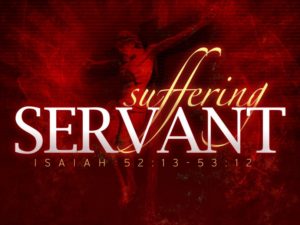 Warren Wiersbe, in his Bible Exposition Commentary on the Prophets, answers the question- “Who does Isaiah 53 refer to?”:
Warren Wiersbe, in his Bible Exposition Commentary on the Prophets, answers the question- “Who does Isaiah 53 refer to?”:
The messianic interpretation of Isaiah 53 was held by Jewish rabbis till the twelfth century. After that, Jewish scholars started interpreting the passage as a description of the sufferings of the nation of Israel. But how could Israel die for the sins of Israel (v. 8)? And who declared that Israel was innocent of sin and therefore had suffered unjustly (v. 9)? No, the prophet wrote about an innocent individual, not a guilty nation. He made it crystal clear that this individual died for the sins of the guilty so that the guilty might go free. The Servant that Isaiah describes is the Messiah, and the New Testament affirms that this Servant-Messiah is Jesus of Nazareth, the Son of God (Matt. 8:17; Mark 15:28; Luke 22:37; John 12:38; Acts 8:27-40; 1 Peter 2:21-24).
The fourth Servant Song is constructed of five stanzas, each containing 3 verses.
The first stanza concerns His impact at large as the Shocking Servant (Isaiah 52:13-15).
He comments on the shocking impact of His ascension (52:13; Eph 1:20-23), His outward appearance (52:14), and His atoning work for people of every tribe and tongue (52:15; 1 Peter 1:1-2).
The second stanza focuses on the Messiah as The Suffering Servant as a man of sorrows in Isaiah 53:1-3. Isaiah 53 is referenced in the New Testament more than any other Old Testament chapter with over 41 citations.
It is the arm of the Lord (Jesus) who provides salvation to those who believe (53:1).
Jesus did not come as a mighty tree but as a tender shoot. He did not arrive with pomp but was born in poverty. In a world that idolizes outward beauty, Jesus succeeded without it. People were ashamed of him, looking the other way when He passed by because He contradicted their worldly values of material wealth, human wisdom, social prestige, lording over others, etc.
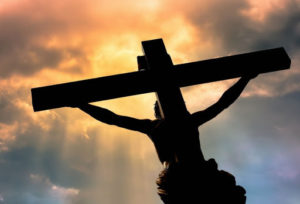 The third stanza has to do with the Messiah as The Smitten Servant. This stanza strikes the heart of the gospel and is inferred in Paul’s New Testament writings (1 Corinthians 15:3).
The third stanza has to do with the Messiah as The Smitten Servant. This stanza strikes the heart of the gospel and is inferred in Paul’s New Testament writings (1 Corinthians 15:3).
1 Corinthians 15:3 3 For I delivered to you as of first importance what I also received, that Christ died for our sins according to the Scriptures,
1 Peter 2:24 24 and He Himself bore our sins in His body on the cross, so that we might die to sin and live to righteousness; for by His wounds you were healed.
Romans 5:8 8 But God demonstrates His own love toward us, in that while we were yet sinners, Christ died for us.
2 Corinthians 5:21 21 He made Him who knew no sin to be sin on our behalf, so that we might become the righteousness of God in Him.
He died, not because of anything He had done (He was without sin), but because He chose to identify with us and be wounded for our (not His) transgressions (53:5).
Jesus bore our sins on the cross as well as its consequences. Among the consequences of our sin is the residue of the fall, our sin nature, sickness and death. Jesus died to ultimately release us from these consequences, and will do so in full when He returns.
The truth regarding our sin nature and Jesus’ work as our sin-bearing substitute is powerfully expressed in verse 6:
Isaiah 53:6 6 All of us like sheep have gone astray, each of us has turned to his own way; But the LORD has caused the iniquity of us all to fall on Him.
The fourth stanza describes the Messiah as “The Silent Servant” (53:7-9). The servant is not permitted to talk back. On the day of Jesus’ crucifixion, Jesus was silent before His accusers: Caiaphas (Matthew 26:62-63); the chief priests and elders (Matthew 27:12); Pontius Pilate (27:14; John 19:9); and Herod Antipas (Luke 23:9).
Verse 9 prophesies his burial and His sinlessness-
Isaiah 53:9 And they made his grave with the wicked and with a rich man in his death, although he had done no violence, and there was no deceit in his mouth.
 The final stanza explains the work on the cross from God’s point of view. The atoning sacrifice of the Son is vindicated by the Father in the resurrection. The Messiah is The Satisfied Servant (Isaiah 53:10-12).
The final stanza explains the work on the cross from God’s point of view. The atoning sacrifice of the Son is vindicated by the Father in the resurrection. The Messiah is The Satisfied Servant (Isaiah 53:10-12).
His death was not an accident. It was an accomplishment. Jesus died to make full atonement for our sins as our Substitute. He does not remain dead. His days are prolonged in resurrection power and glory. Because of His righteous life and death, He is raised from the dead. He sees the offspring of His suffering, bringing many sons into glory (53:10; Hebrews 2:10). He bore this testimony on our behalf, saying, “I always do the things that are pleasing to Him.” (John 8:29) His righteous living and dying justifies those who believe.
Isaiah 53:11-12 11 As a result of the anguish of His soul, He will see it and be satisfied; By His knowledge the Righteous One, My Servant, will justify the many, As He will bear their iniquities. 12 Therefore, I will allot Him a portion with the great, And He will divide the booty with the strong; Because He poured out Himself to death, And was numbered with the transgressors; Yet He Himself bore the sin of many, And interceded for the transgressors.
TODAY’S READING FROM THE NEW TESTAMENT – EPHESIANS 5:1-33
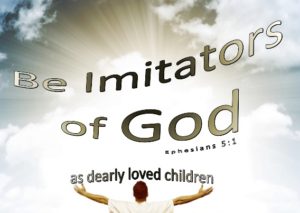 We are children of our heavenly Father, born of His Spirit, and made alive through faith in Christ. Jesus said, “He who has seen me has seen the Father”. We are to look to Jesus and trust that the Holy Spirit will imprint His characteristics upon our souls so we can resemble our Father.
We are children of our heavenly Father, born of His Spirit, and made alive through faith in Christ. Jesus said, “He who has seen me has seen the Father”. We are to look to Jesus and trust that the Holy Spirit will imprint His characteristics upon our souls so we can resemble our Father.
Ephesians 5:1 1 Therefore be imitators of God, as beloved children.
Paul is not asking people to try to be like Christ through carnal imitation. He is calling people to trust Christ and become like Christ through the Spirit’s power for transformation (2 Cor 3:18, Romans 8:29-30).
Paul continues to describe the outliving of the Indwelling Christ as a walk. We are to walk worthily and walk in love (4:1; 5:2). This new life is to be lived out in the context of our relationships.
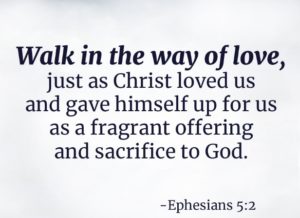 God is love (1 John 4:8), and therefore as children bearing our Father’s likeness, we are to walk in love (5:2), taking our cues from the selfless concern of Christ who offered up His life on the altar of the cross for the benefit of others. God is light (1 John 1:5); therefore, we are to walk in purity as children of light (Ephesians 5:3- 14). Light is undefiled and pure. God is truth (1 John 5:6); therefore, we are to walk in wisdom as those born of the truth (Ephesians 5:15-17; 1:13).
God is love (1 John 4:8), and therefore as children bearing our Father’s likeness, we are to walk in love (5:2), taking our cues from the selfless concern of Christ who offered up His life on the altar of the cross for the benefit of others. God is light (1 John 1:5); therefore, we are to walk in purity as children of light (Ephesians 5:3- 14). Light is undefiled and pure. God is truth (1 John 5:6); therefore, we are to walk in wisdom as those born of the truth (Ephesians 5:15-17; 1:13).
We must not be deceived by those who say they are of the light but walk in darkness.
Ephesians 5:5 5 For this you know with certainty, that no immoral or impure person or covetous man, who is an idolater, has an inheritance in the kingdom of Christ and God.
 Each day we try to learn what is pleasing to the Lord and shun what is not (Ephesians 5:10).
Each day we try to learn what is pleasing to the Lord and shun what is not (Ephesians 5:10).
Light exposes the hidden works of darkness. Walking in the light involves taking responsibility to not participate in unfruitful works of darkness but expose them without being defiled in the process (Ephesians 5:11-12).
As children of the truth, we are to walk in wisdom, redeem the time, understand what God’s will is and do it. Our primary responsibility is to abide in Christ, to be filled (under the control) of the Holy Spirit.
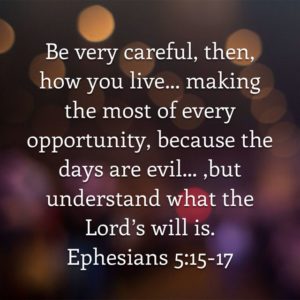 A Spirit-controlled believer will not put ‘self-right’s first but will demonstrate their submission to Christ by honoring and submitting to other portions expressing His life.
A Spirit-controlled believer will not put ‘self-right’s first but will demonstrate their submission to Christ by honoring and submitting to other portions expressing His life.
Verses 18- 33 have to do with our relationships, particularly in the home.
Ephesians 5:21 21 and be subject to one another in the fear of Christ.
He gives instructions to wives and husbands. They should love one another and respect one another, but particular emphasis is given to the women to respect their husbands and for husbands to love their wives. Paul emphasized the equal status of all believers, men and women, Jew and Greek, slave and freemen in their ‘salvation standing’ before God. They are all ‘in Christ Jesus’.
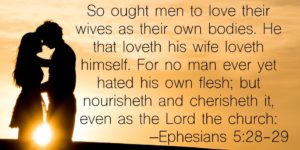 But God has a purpose in reflecting the mystery of the Trinity as a community of oneness in marriage. Jesus is equal in all attributes of divinity, but He willingly submitted to the Father so that the glory of the Father would be displayed through Him. So wives are to submit in such a way to their husbands as to display the reflected glory of the Lord on display in the lives of their husbands.
But God has a purpose in reflecting the mystery of the Trinity as a community of oneness in marriage. Jesus is equal in all attributes of divinity, but He willingly submitted to the Father so that the glory of the Father would be displayed through Him. So wives are to submit in such a way to their husbands as to display the reflected glory of the Lord on display in the lives of their husbands.
Ephesians 5:22 22 Wives, be subject to your own husbands, as to the Lord. (or as Colossians 3:18 says, “as is fitting in the Lord”.)
Submitting to another person does not mean that you become a doormat for another to treat abusively. Christ submitted His will to the Father. He subordinated His rights to the Father, although He shared equal status with the Father. He did this for the glory of God and the good of others. Love motivates us to submit to God’s order of male headship in marriage, in the family, and in the church.
Paul uses twice as many words telling husbands to love their wives than telling wives to submit to their husbands.
How is a husband to love his wife? By sacrificing for her (5:25) by sanctifying her (5:26-27), by safeguarding her (5:28) and satisfying her (5:28), nourishing and cherishing her.
Then Paul lets us in on a previously undisclosed divine fact. Marriage was purposed to reveal a preexisting truth- Christ’s love for the church (Eph 5:32).
TODAY’S READING FROM THE BOOK OF PSALMS – PSALM 69:19-36
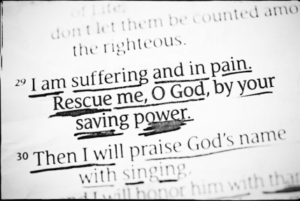 The first part of this Psalm could fall under the prayer heading: “Save me!” (69:1-18). The second part could fall under the heading, “Judge my enemies!” (Psalm 69:19-29). The third part is a prayer of praise “Be Glorified!” (Psalm 69:30-36).
The first part of this Psalm could fall under the prayer heading: “Save me!” (69:1-18). The second part could fall under the heading, “Judge my enemies!” (Psalm 69:19-29). The third part is a prayer of praise “Be Glorified!” (Psalm 69:30-36).
Verses 19-21 reflect the suffering of the Savior. All four gospels record Jesus being offered sour wine and/or vinegar when He is hanging on the cross.
Psalm 69:21 21 They also gave me gall for my food and for my thirst they gave me vinegar to drink.
Verses 22- 28 is the imprecatory section on the Psalm when the psalmist calls for just retribution to fall on tormentors and persecutors. Who is pictured as being persecuted? One who is smitten of God and afflicted (see Isaiah 53:4).
Psalm 69:26 26 For they have persecuted him whom You Yourself have smitten, and they tell of the pain of those whom You have wounded.
The Psalmist describes his personal pain in verse 29:
Psalm 69:29 29 But I am afflicted and in pain; May Your salvation, O God, set me securely on high.
The final section is a holy resolve to offer to the Lord the sacrifice of praise with songs of thanksgiving and all creation following suit.
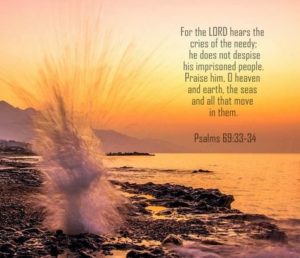 It closes with a statement of faith about the future:
It closes with a statement of faith about the future:
Psalm 69:35-36 35 For God will save Zion and build the cities of Judah, that they may dwell there and possess it. 36 The descendants of His servants will inherit it, and those who love His name will dwell in it.
TODAY’S READING FROM THE BOOK OF PROVERBS – PROVERBS 24:7
Proverbs 24:7 7 Wisdom is too exalted for a fool, He does not open his mouth in the gate.
We read in Psalms 14:1 and 53:1 that the fool has said in his heart that there is no God. This deliberate rejection of God’s self-revelation demonstrates that wisdom is beyond their reach. They are out of their depth when it comes to understanding things that are real and eternal. When important issues are discussed in the community, (that is, ‘at the gate’) because their understanding is darkened, they have nothing of wisdom to contribute.
PRAY FOR THE NATIONS – CONTINUE TO PRAY FOR PAKISTAN
PRAYER: We praise You Father, Son, and Holy Spirit, Thrice holy and perfect in all Your ways. We have seen Your sacrificial love on display in our Old and New Testament readings today. Lord Jesus, You are the Shocking, Sorrowful, Smitten, Silent, and Satisfied Servant prophesied in Scripture who died as our Substitute and rose to be our Justifier! We thank You for the mystery of the cross. We want to walk worthy of our calling, in love, light, wisdom, and truth. Help us to redeem the time. May we put your glory on display in our personal lives as we submit ourselves to the person of the Holy Spirit. And may that glory be reflecting in our marriages, in our homes, in the workplace, and in our church. In Jesus’ Name. Amen.
